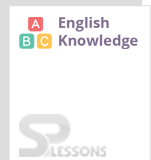 Introduction
Introduction
English Knowledge is an important section in the employment-related competitive exams in India. In particular, exams like SSC, SBI, IBPS and other bank-related employment exams have English Language questions along with Reasoning and Quantitative Aptitude. The English Language section primarily has questions related to Reading Comprehension, Cloze Test, Fill in the Blanks, Error Spotting, Grammar, Sentence Improvement, etc. This article SSC Selection Post Phase-VII English Language Quiz 4 presents the sample questions and answers related to English Language
 Quiz
Quiz
Direction (1-2): In these questions some of the sentences have errors and some have none. Find
out which part of a sentence has an error and indicate it corresponding to the appropriate letter.
If there is no error, indicate corresponding to the last option.
Q1. But there is no open dissent at Buddhism, (A)/ and those who discard its dogmas, (B)/as a rule, venerate it as an ethical system.(C)/ No Error (D)
-
A. A
B. B
C. C
D. D
-
A. A
B. B
C. C
D. D
-
A. extrication
B. extermination
C. exasperation
D. extraction
-
A. affluent
B. effluents
C. amulets
D. influents
-
A. apihelion
B. apheleion
C. aphelion
D. aphileon
Direction (1-5): A passage is given with 5 questions following it. Read the passage carefully and choose the best answer to each question out of the four alternatives.
A guest speaker was addressing the faculty and the students in the college auditorium. I had joined the faculty the year before and was already drawing attention. I was 27, full of assumptions about myself, quick with a comment on everything, and expected people to pay attention to all that I had said. I listened to the talk for the first five minutes. By the seventh, I was looking around to check if others were listening. By the tenth, I had glanced at my watch three times and yawned once. After twenty minutes I was thoroughly bored, and telling myself that it was difficult to sit through such an insipid talk. I wanted to share some of my expert comments with my neighbor. But he was completely sold out to the speaker and looked like it was the greatest day of his life. I was disgusted. I tried to catch a word or phrase from the talk, only to convince myself that this should be his last talk ever.
The one-hour talk took ages to end, and before the thanks were said, I jumped to my feet with a sigh of relief. My neighbor smiled at me and said, “The talk was wonderful, wasn’t it?” I retorted, “It almost killed me with kindness”.
Q1. What do you understand about the narrator from the description in the first paragraph?
-
A. He was a genius
B. He was knowledgeable
C. He was self-conceited
D. He was charismatic
-
A. He was glued
B. He was bored
C. He did not mind it
D. He was engrossed in it
-
A. His neighbor was engrossed in an insipid talk
B. The talk was boring
C. He could not understand it
D. He was impatient
-
A. Happy
B. Relieved
C. Exhausted
D. Disgusted
-
A. Seven minutes
B. Ten minutes
C. Five minutes
D. Twenty minutes
Direction (1-2): In the following questions, out of the four alternatives, select the word opposite
in meaning to the word given.
Q1. WELTER
-
A. Orderliness
B. Tumble
C. Mishmash
D. Empathy
-
A. Barren
B. Green
C. Beautiful
D. Leafy
-
A. Hardening
B. Sneezing
C. Trepidation
D. Reversal
-
A. shake
B. burn
C. polish
D. abuse
-
A. Watch for danger or threats to oneself
B. To ignore a person’s request
C. To be obsessed with one’s own semblance
D. To take attention or credit away from someone else





